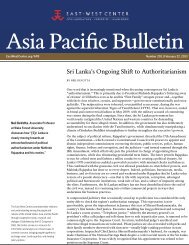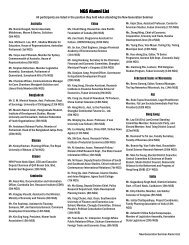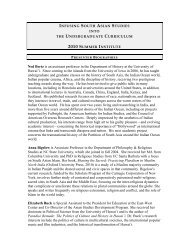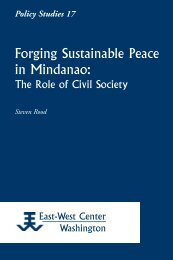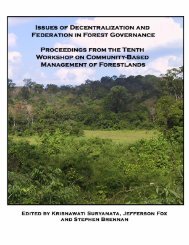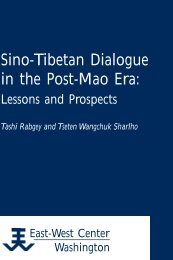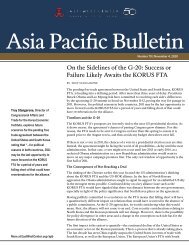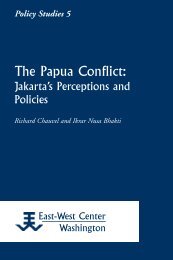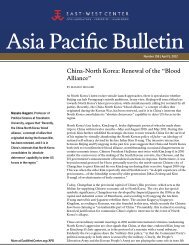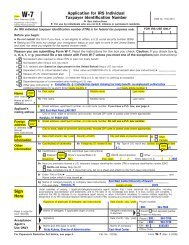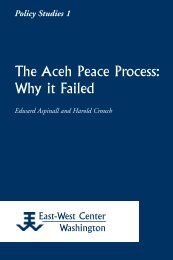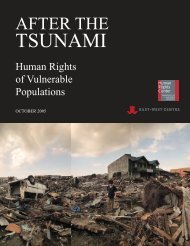Constructing Papuan Nationalism: History, Ethnicity ... - ScholarSpace
Constructing Papuan Nationalism: History, Ethnicity ... - ScholarSpace
Constructing Papuan Nationalism: History, Ethnicity ... - ScholarSpace
- No tags were found...
Create successful ePaper yourself
Turn your PDF publications into a flip-book with our unique Google optimized e-Paper software.
48 Richard Chauvelat provincial or national levels. No <strong>Papuan</strong>s were appointed as Ministers oras senior officials in central government departments. 75 Nor were <strong>Papuan</strong>sever appointed to positions as governor or other senior officials in provinceselsewhere in Indonesia. Meanwhile, Indonesians from Aceh to Malukuflooded into Papua to assume positions that had previously been held by<strong>Papuan</strong>s. From the lowest to the most senior levels of the bureaucracy,<strong>Papuan</strong> officials were excluded from the administration and “becameobservers and foreigners in their own country.” 76 Wayoi was not the only<strong>Papuan</strong> to make this observation. ClemensRunaweri relates that many of the <strong>Papuan</strong>s whowere prepared to work in the Indonesian administrationwere removed from their positions,because of their nationalist political views.Another leading nationalist who was eventuallystripped of his position was Nicolaas Tanggahma,who had served until early 1968 as head of theBureau of Public Administration. Even less politicalsenior <strong>Papuan</strong> officials, such as ArnoldMampioper and M. B. Ramandey, lost their positions in the period leadingup to the “Act of Free Choice.” Furthermore, though the <strong>Papuan</strong> politicalelite had been well represented in the New Guinea Council elected in 1961,after 1963 they were increasingly excluded from the legislative positions.For example, in 1963 the New Guinea Council was replaced by whatClemens Runaweri describes as “a new Indonesian democratic institutionwith appointed members.” The new council was a symbolic institutionheaded by the governor and with no powers to make laws—in Runaweri’sterms, a “farce democracy.” This council, the Dewan Perwailian RakyatDaerah-Gotong Royong (Provincial Parliament–Mutual Assistance,DPRD-GR), of which Clemens Runaweri was one of the members, wasitself abolished in November 1968, because the majority of its memberswere thought to be subversives and separatists. 77E. J. Bonay, Herman Wayoi, Fritz Kirihio, and Clemens Runawerihad been among the <strong>Papuan</strong> beneficiaries of the Netherlands policies ofrapidly expanding educational opportunities, political advancement, and<strong>Papuan</strong>ization of the bureaucracy. They were the formulators of <strong>Papuan</strong>nationalism and, if the Netherlands’ plans for decolonization had beenrealized, they might have been the leading politicians of an independentWest Papua. Their pragmatism and initial acceptance of Indonesian ruleThe rivalries and antagonismsbetween <strong>Papuan</strong>sand Indonesians…wereeven more apparentafter Indonesiatook control.



